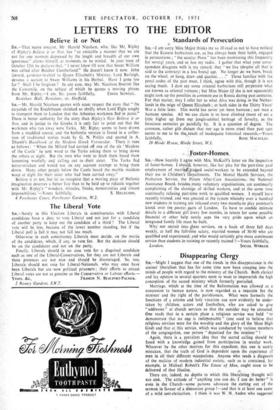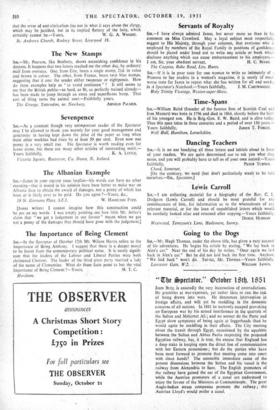• Disappearing Clergy
SIR.—Might I suggest that one of the trends in this disappearance is the sinister liberalism that has for some time now been creeping into the minds of people with regard to the ministry of the Church. Both clerical and lay opinion in several quarters seem to want to impoverish the high conception of the sacred ministry which formerly prevailed.
Marriage, which at the time of the Reformation was allowed as a concession to human nature, is now regarded as a requisite for the minister and the right of the parishioners. What were formerly the functions of a solemn and holy vocation can now evidently be under- taken by children, actors and footballers, Who are asked 'to give "addresses" at church services so that the outsider may be attracted. One reads that in a certain place a religious service was held " to demonstrate that .no orLe is indispensable " (one used to believe that religious services were for the worship and the glory of the Most High God) and that at this service, which was conducted by various members of the congregation, one person " deputised for the minister " !
Again, there is a prevalent idea that the' sacred calling should be fused with a knowledge gained from participation in secular work. Whatever be the other motives for this expedient, this one is surely mistaken, that the truth of God is dependent upon the experience of men in all their different occupations. Anyone who reads a diagnosis of the malaise of modern industrial society, such as is contained, for example, in Michael Robert's The Estate of Man, ought soon to be delivered of that illusion.
There are, indeed, no depths to which this liberalising thought will not sink. The attitude of "anything you can do, I can do better" is even in the Church—some parsons advocate the cutting out of the sermon in favour of a diteussion group !—and that is at least one cause of a mild anti-clericalism. I think it was W. H. Auden who suggested that the error of anti-clericalism lies not in what it says about the clergy, which may be justified, but in its implied flattery of the laity, which



































 Previous page
Previous page